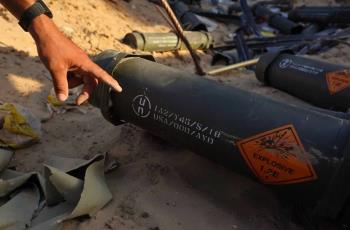Syrian President Bashar al-Assad has emphasized his complete refusal of any invasion of Syrian land under any pretext, noting that Syria will continue to fight terrorism by all legitimate means.
Speaking in a telephone conversation with his Russian counterpart Vladimir Putin late on Tuesday, Assad thanked the Russian leader for reaching an agreement with Turkish President Recep Tayyip Erdogan to establish "a safe-zone" in northeastern Syria and conduct joint patrols in the area after marathon talks in the Black Sea resort of Sochi.
The Syrian president also “expressed his full support for the results of the work, as well as the readiness of the Syrian border guards, together with the Russian military police, to reach the Syrian-Turkish border.”
Putin, for his part, briefed Assad on the results of his talks with Erdogan, and highlighted that the main provision of the memorandum of understanding agreed upon during the meeting was to restore the territorial integrity of Syria and to continue joint efforts concerning Syria’s political settlement, especially the work within the framework of the country’s constitutional committee.
The Russian president told Assad that any agreement between Turkey and Russia will focus on fighting all kinds of terrorism and dismantle any separatist agendas on the Syrian land.
Earlier in the day, Putin and Erdogan signed a memorandum of understanding, stating that Kurdish forces must withdraw from a Turkish-ruled "safe zone" in northeast Syria within 150 hours, after which Ankara and Moscow will run joint patrols around the area.
The announcement was made hours before a United States-brokered five-day truce between Turkish and Kurdish-led forces was due to expire.
On October 9, Turkish military forces and Ankara-backed militants launched a long-threatened cross-border invasion of northeast Syria in a declared attempt to push Kurdish fighters from the People's Protection Units (YPG) away from border areas.
Ankara views the US-backed YPG as a terrorist organization tied to the homegrown Kurdistan Workers' Party (PKK), which has been seeking an autonomous Kurdish region in Turkey since 1984. The YPG constitutes the backbone of the Kurdish-dominated Syrian Democratic Forces (SDF).
The Kurdish-led administration in northeastern Syria says the Turkish offensive has killed 218 civilians, including 18 children, since its outset. The fighting has also wounded more than 650 people.
Turkish authorities say 20 people have been killed in Turkey by strikes from Syria, including eight people who were killed in a mortar attack on the town of Nusaybin by YPG militants on October 11.
On October 17, US Vice President Mike Pence said Washington and Ankara had agreed on a five-day ceasefire in Turkey's attacks on Kurdish fighters in the region.
The agreement followed negotiations between Pence and Erdogan at the presidential palace in Ankara.
Pence said Ankara would pause its offensive, dubbed Operation Peace Spring, for 120 hours in order to allow YPG militants to withdraw 30 kilometers from the Turkey-Syria border.
Once the withdrawal is complete, “Operation Peace Spring will be halted entirely,” Pence told reporters.
Lavrov: US position on Syria “changeable and contradictory”
Meanwhile, Russian Foreign Minister Sergei Lavrov has condemned Washington’s “changeable and contradictory” position on Syria, stating that the US-led military coalition purportedly fighting the Daesh terrorist group is illegally present on the Syrian soil.
“We do not especially look back at the United States and their position. Firstly, this position is rather changeable and contradictory. Secondly, the coalition that the United States lead is illegally on the Syrian territory. It is well known. I hope that those seedlings of understanding among some of the members of the coalition that the policy should be changed, that there is need to cooperate with the Syrian government, I hope those seedlings rise,” Lavrov said in Sochi.
He added, “The Russian Federation, represented by its military police, together with the Turkish forces will patrol this territory (Syria-Turkey border from the Syrian side outside of Operation Peace Spring area) a week after the memorandum comes into force, tomorrow noon. The units of so-called Kurdish Syrian Democratic Forces will be withdrawn from this area for 30 kilometers. Ten kilometers of this 30-kilometer zone will be the area of joint patrols by Russia and Turkey.”
Syrian army forces deploy in nearly dozen Hasakah villages
Separately, Syrian government forces have deployed in nearly a dozen villages in the northwestern countryside of Syria’s northeastern province of al-Hasakah.
Syria’s official news agency SANA reported that Syrian army units entered the villages, including al-Kozaleya, Shuwaish, al-Nawfaliyah, al-Mahal, al-Badran, al-Hizam, Kahfet al-Marati and al-Dubaib, on Tuesday and began setting up posts there.
In another development, the Republican chairman of the US Senate Foreign Relations Committee said on Tuesday that sanctions must be imposed on Turkey if it continues its offensive against Kurdish forces in northeastern Syria.
“If Turkey maintains its aggressive path, it must bear a cost for undermining US security interests,” Senator Jim Risch said.
Foreign Minister Mevlut Cavusoglu said on October 16 that Turkey will retaliate against US sanctions over his country’s military incursion into northeast Syria.
Speaking in parliament, Cavusoglu described all threats and sanctions against Turkey as unacceptable, adding that Ankara expected the US Congress to turn back from its “damaging approach.”
The top Turkish diplomat noted that ties between Ankara and Washington were at a critical juncture, emphasizing that he would convey this to the coming US officials.
The remarks came a day after US President Donald Trump imposed sanctions on Turkey over Ankara's military operation in northeast Syria, and called for an immediate ceasefire.
The sanctions apply to individuals, entities or associates of the Turkish government involved in “actions that endanger civilians or lead to the further deterioration of peace, security and stability in northeast Syria,” US Secretary of State Mike Pompeo said in a statement.
Source: Press TV



























